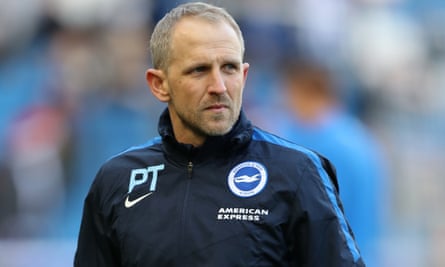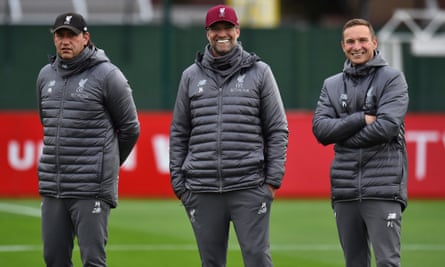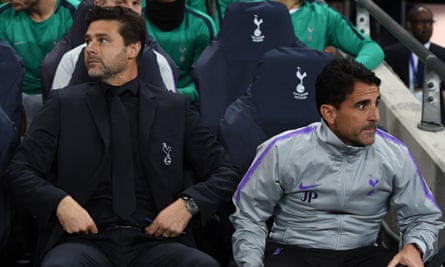Arsenal: Juan Carlos Carcedo
Known as Carlos, the 45-year-old Spaniard is building up good relationships with the Arsenal players, even if he is not the type to shy away from confrontation. Fiery and animated, if he feels that something needs to be said, he will say it – even to Unai Emery. Arsenal are the sixth club at which he has worked as Emery’s assistant, following Almería, Valencia, Spartak Moscow, Sevilla and PSG. Carcedo was an uncompromising midfielder, who had spells with Atlético Madrid and Nice but played mainly at second division level. David Hytner
Bournemouth: Jason Tindall
The 40-year-old did not have much of a relationship with Eddie Howe during their playing days at Bournemouth but the pair have been inseparable since becoming the youngest managerial partnership in the Football League in 2008. Howe would not have been able to lead Bournemouth into the Premier League without the support of his No 2. Tindall’s coaching and people skills are invaluable assets. “He is approachable, the ear for the players,” Howe says. Jacob Steinberg
Brighton: Paul Trollope
The 46-year-old’s most recent attempt to succeed as a No 1 saw him fall short at Cardiff City. However the former Bristol Rovers manager was part of Chris Coleman’s staff when Wales reached the semi-finals of Euro 2016 and Chris Hughton quickly turned to him when Colin Calderwood left Brighton two years ago. Hughton worked with Trollope at Birmingham and Norwich and they have enjoyed plenty of success at Brighton. JS

Burnley: Ian Woan
“We are not one of these management teams who are gone by two o’clock,” Ian Woan says of his relationship with Sean Dyche. The pair met while playing under Brian Clough at Nottingham Forest, and for the past six years have shared a flat just outside Burnley that Woan – best man at Dyche’s wedding – describes as like a script idea for The Young Ones. Both return to family homes in the east Midlands as often as a busy schedule allows. When at work Woan is responsible for devising and supervising training routines while Dyche keeps a close eye on players’ progress. Paul Wilson
Cardiff City: Kevin Blackwell
Blackwell is not the stereotypical No 2 given he has racked up close to 500 games as a manager. His relationship with Neil Warnock, Cardiff’s manager, goes back to when he played under him at Scarborough in 1986. Warnock trusts Blackwell implicitly but the 59-year-old is more than a sounding board. Working closely with Ronnie Jepson, the first-team coach, Blackwell takes much of the training and does a lot of tactical work on opponents. Stuart James

Chelsea: Gianfranco Zola
Zola and Luca Gotti are both titled as assistant first-team coaches. The latter arrived from Bologna, while Zola’s reputation – voted Chelsea’s greatest ever player and a former manager in England – precedes him. Zola had come across Maurizio Sarri only occasionally in Italy but his return helped appease a fanbase unsettled by last season’s rancour, and offered support for his compatriot as the head coach settled in. “I know the Premier League, I know the club,” he said. Where Sarri tends to lead training sessions, Zola supports and takes the likes of Eden Hazard, Pedro, Willian and Ross Barkley for attacking drills. He also acts as a bridge between Sarri and the players, speaking with the squad. Dominic Fifield
Crystal Palace: Ray Lewington
Lewington has worked with Hodgson since the latter’s appointment as Fulham’s manager more than a decade ago, and through a spell with England, though the pair first met when Hodgson oversaw Lewington’s preliminary coaching badges. The 62-year-old is the Palace manager’s confidant. They plan and execute training together, with Lewington spending time with the analysts working on videos and presentations for player meetings and preparation for games. Lewington says: “Both of us are ‘coaches’ at heart and believe the majority of work, 95%, should be on the training pitch trying to put things right. We’re old-fashioned in that sense.” DF
Everton: João Pedro Sousa
The Portuguese coach has been Marco Silva’s right-hand man at every step of Silva’s managerial career, the pair having become friends when they played for Trofense 20 years ago. Sousa started his coaching career with Braga’s under-19s before joining Silva at Estoril, where they won promotion to the top flight and took the club into Europe. They moved on to Sporting Lisbon, Olympiakos, Hull City and Watford together before arriving at Everton this summer. Silva trusts Sousa to lead the training sessions. Andy Hunter
Fulham: Javier Pereira
Slavisa Jokanovic inherited Pereira at Watford in 2014 and was struck by his ability to read matches, usually from a vantage point up in the stand. These days, the former Spanish second division player occupies the seat next to Jokanovic on the Fulham bench, having worked alongside him at Maccabi Tel Aviv. Pereira took his first steps in coaching at academy level before working up to La Liga with Levante. “Javier is the most important part of my staff,” Jokanovic says. “He is calm, experienced; a prepared man. We share all of the work together: the defending, attacking and set pieces.” DH
Huddersfield Town: Christoph Bühler
Former teammates at Weinham in the German lower leagues, Bühler and David Wagner have been coaching together for a decade, beginning at Hoffenheim and continuing at Borussia Dortmund’s reserves before moving to Huddersfield. Bühler is in charge of analysis at the Yorkshire club, with responsibility for identifying opponents’ strengths and weaknesses and also for running video sessions to familiarise recruits with Huddersfield’s style and the particular demands of each position. Paul Doyle
Leicester City: Jacques Bonnevay
Joined Leicester in June to replace the departing Michael Appleton, who was part of Craig Shakespeare’s staff before Claude Puel took over as manager. Aged 57, Bonnevay is vastly experienced and has coached in the UAE, Morocco, Turkey and Japan as well as in France. His influence at Leicester is limited, however, because Puel is so hands-on and oversees everything. Bonnevay puts on a few drills but Puel takes the training sessions. SJ
Liverpool: Pepijn Lijnders/Peter Krawietz
Officially Zeljko Buvac remains first assistant coach at Liverpool – and is listed as such on the club’s website – even though his 17 years as “the brain” alongside Jürgen Klopp ended days before last season’s Champions League semi-final at Roma. Lijnders returned to the club this summer following a five-month spell in charge of NEC Nijmegen and, though title-less at present, the 35-year-old former PSV Eindhoven and Porto academy coach works alongside Krawietz, Klopp’s former chief scout at Mainz and analyst at Borussia Dortmund. Klopp leads the training sessions – he is every inch the tracksuit manager – but involves Krawietz and Lijnders in daily tactical meetings. AH

Manchester City: Mikel Arteta
The Spaniard had a pivotal role in Pep Guardiola’s transformation of City from third place in 2016-17 to last season’s record champions because of a willingness to offer his own take on tactics and strategy. Arteta is also the foil between the manager and players and a popular figure around the club. When performing media duties for September’s Lyon Champions League defeat his honesty was striking, admitting City had not been “consistent”. Jamie Jackson
Manchester United: Michael Carrick
After Rui Faria, José Mourinho’s assistant of 17 years, left in the summer the manager declared he would no longer have a No 2. “I’m going to have coaches, assistant coaches, fitness coaches and a structure where we have specialists in different areas,” Mourinho said. He did, though, state that in the future the role is to be filled by Michael Carrick. “When he has his badges and his pro licence.” Although during matches Carrick can often be seen in conversation with Mourinho, how much material input the former United midfielder has is unclear. JJ
Newcastle: Francisco de Miguel Moreno
Rafa Benítez has a tightly knit backroom team, also including Mikel Antía, his influential first-team coach, but Moreno – or “Paco” as the 45-year-old is known – is his No 2. “Miguel is my big picture man,” says Benítez. “He is assistant manager and has a degree in physical education from Spain. He controls the training sessions, regulating the physical load on each player. Along with the doctor, he is in charge of what each player can do.” Moreno also worked with Newcastle’s manager at Liverpool, Internazionale and Chelsea. Louise Taylor
Southampton: Mark Bowen
Bowen is central to one of the tightest coaching units in the business. He has worked alongside the manager, Mark Hughes, and Eddie Niedzwiecki since the turn of the millennium when they were with Wales and, since then, the trio have been at Blackburn, Manchester City, Fulham, QPR and Stoke before the move to Southampton. Bowen also played with Hughes for Wales. He is prominent in every training session – he will run through the set pieces on the days before matches – and he has a vital off-field role in terms of the organisation of meetings and travel. DH
Tottenham: Jesús Pérez
Mauricio Pochettino calls Pérez his “brother” and the pair have been inseparable since they got together at Espanyol in 2010. Pérez is best known at Tottenham for overseeing the squad’s finely calibrated conditioning programme but he is Pochettino’s link to practically every department at the club. Known for his meticulousness, the one-time journeyman fitness coach was never a professional player. Pérez’s responsibilities at Spurs include pre-match tactical presentations and one-on-ones with every player.

Watford: Zigor Aranalde/Juan Solla
Javi Gracia has two assistant coaches. Zigor Aranalde, who played in England and previously scouted for Brighton and West Brom, assists with coaching, opposition research and set pieces. Juan Solla, a long-term associate of Gracia’s, is focused on fitness and conditioning. Isidre Ramón Madir joined the coaching team in the summer as a tactical analyst and has a similar status, if not the same title, as Aranalde and Solla. Simon Burnton
West Ham: Rubén Cousillas
Nicknamed El Flaco (“Skinny”), the Argentinian has been Manuel Pellegrini’s trusted lieutenant since linking up with the Chilean at San Lorenzo. A former goalkeeper, the 61-year-old commands respect because of his calmness and understands what makes players tick. “For me the essence of football is greater than money,” Cousillas says. “I was not anyone in football, and you never think of the money when you are playing or training.” JS
Wolverhampton Wanderers: Rui Pedro Silva
One of five Portuguese staff working under Nuno Espírito Santo, Silva is the Wolves head coach’s long-time confidant. He worked with Nuno at Rio Ave and Valencia, and has his complete trust. Nuno is a hands-on coach, which means Silva operates in more of an organisational capacity. His touchline celebrations, together with those of the rest of the coaching staff, caused quite a stir in the Championship. “It’s just the way we live the moment,” Silva explained. SJ
